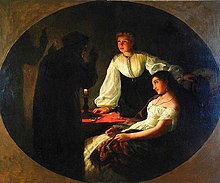St. Andrew's Night
The Andrew's Day is the night of November 30 (Andrew's Day), the death of St. Andreas .
According to old folk belief , this night is known as a lottery night , as is Christmas , New Year's Eve or St. Thomas ( December 21st ) is particularly suitable to bind the desired future spouse to yourself or to first find out who it will be. This is due to the fact that St. Andreas is not only the patron saint of fishermen, but also of lovers and marriages.
The customs for this vary: You look into the fire and say a little saying or prayer ( St. Andrew's prayer ), and then the future person should appear in the fire or mirror. Or you eat a bread roll in three bites, and whoever meets you first should be. The Brothers Grimm wrote it down in their "Deutsche Sagen":
- “It is a belief that a girl can invite and see her future loved one on Andreas Night, Thomas Night, Christ Night and New Year's Night. There has to be a table for two, but no forks are allowed. What the lover leaves behind when they leave must be carefully saved, he then comes to the one who owns it and loves her dearly. But he must never see it again, because otherwise he thinks of the agony he suffered from superhuman violence that night and he becomes aware of the magic that causes great misfortune. "
Another custom is slipper throwing, in which an unmarried girl throws her left slipper over her shoulder towards the door. If the point of the slipper falls to the door, it means that it will get married that same year. In Poland there is a similar custom on Andrew's Night, called Andrzejki , where the shoes of all the girls present are formed into a queue to the door by putting the last shoe on the tip. The girl whose shoe touches the door will be the first to marry.
There are also customs that are related to other things. The quiet gathering of chestnut, birch, willow, lilac and fruit tree branches on St. Andrew's evening (should bring spring into the house in winter) is part of it. The children also ran masked, reciting funny verses, from house to house and were given presents in return (cf. similar winter customs, e.g. on Halloween ). Another Andreas custom from Poland is reading the future from wax poured into cold water. The farmers also use November 30th for prophecy:
- Andreas snow - does corn and wheat hurt!
Trivia
- St. Andrew's Night is also the focal point in Siegfried Wagner's opera “Bruder Lustig” .
- In Jena / Thuringia the verse for the children's parades was as follows:
- I am little Andreas
- dear people, give me something.
- Don't give me too little
- i'm a little king!
- Don't let me stand too long
- I have to go a little house.
Web links
literature
- Brothers Grimm : German legends . Cologne 2006. ISBN 3-938484-82-9
